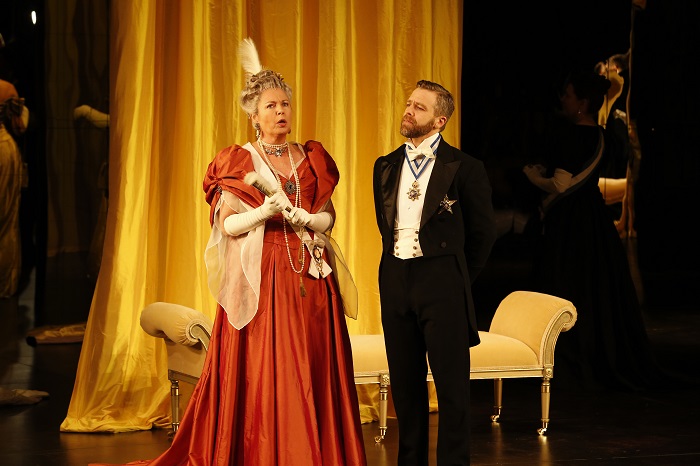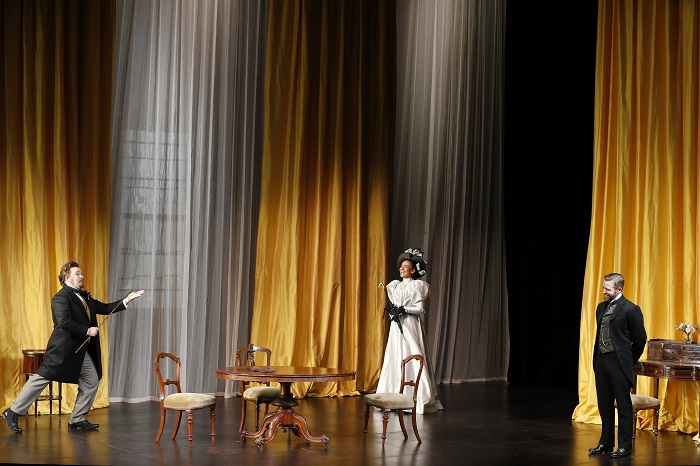William McInnes and Michelle Lim Davidson in An Ideal Husband. Photo by Jeff Busby.
Oscar Wilde’s plays have gathered attention for over a hundred years. But it is something to do justice to a text while contributing new life to its story. MTC’s revival brings a robust render to the narrative of unavoidable corruption in a money-made society. From the production’s opening scene in Sir Robert (Simon Gleeson) and Lady Chiltern’s (Zindzi Okenyo) London parlour, we are immersed into a world of wit and moral subversion of Wilde’s urban-conscious society comedies.
The rapid-fire repartee between Mrs Marchmont (Jem Lai) and Lady Basildon (Greta Sherriff) is expounded by the on-stage presence of Mrs Markby, brilliantly cast as Gina Riley, and the unprincipled blackmailer, Mrs Cheveley (Christie Whelan Browne), where shrewd aphoristic interchange exposes the self-fabrication and role-playing of society. ‘Nothing is so dangerous as being too modern,’ quips Mrs Markby, ‘One is apt to grow old-fashioned quite suddenly.’ Rounded out by Miss Mable Chiltern (Michelle Lim Davidson), who brays around the ineffable dandy Lord Goring (Brent Hill), An Ideal Husband sits squarely within Wilden’s preoccupation with high/low art, dress and design and the bling of modern life.
Yet Dean Bryant’s direction of Wilde’s language makes you stop and think about the ideas behind it – it’s witty, titanically funny, but it makes you consider social clichés and disrupts any prevailing ideology. Of course, Wilde is well received in this kind of critique. Bryant’s strength lay in casting, which sees the brilliant turning of Riley as Lady Markby, and in equal measure, William McInnes as The Earl of Caversham. When Riley or McInnes take to the stage, the comedy flights upward. But it is the dandy, Lord Gorling, who carries the weight of Wilde’s collapse of aesthetics and ethics. Hill plays Goring with brio; the dandy’s aesthete nonchalance, acting at the level of a personality freed from confines of everyday life. In response to heeding paternal advice, he quips, ‘I always pass on good advice. It is the only thing to do with it. It is never of any use to oneself.’

Gina Riley and Simon Gleeson in An Ideal Husband. Photo by Jeff Busby.
The formalism of Social French Comedy is writ large in naïve and puritanical embodiment of the devoted wife. Here, however, Lady Chiltern’s passion for ignorance is less an observation than an insight into the malformation of the ‘ideal’ husband. In the series of inversions, she too is compromised by her ‘debasement’. The gender politics of the play thereby become another surface to skate over. As Sir Robert Chiltern bellows, ‘The error all women commit. Why can’t you women love us, faults and all? Why do you place us on monstrous pedestals? We have all feet of clay, women as well as men.’
In his 1891 essay, The Decay of Lying – An Observation, Wilde underscores truth at the expense of art, liberating the former in the ‘uselessness’ of the latter. In An Ideal Husband, the exposure of truth is metered out scene-by-scene in heady mix of melodrama and comedy. (Written at the height of the playwright’s powers, its performance preceded his arrest for gross indecency in April 1985 by some months, where the threat of public shaming casts something of a nuanced hue.) But it does not simply reverse conventional morality for its own sake.
Dale Ferguson’s curatorial attention to interior architecture and his immaculate costumes, where the whalebone dresses harken back to divisive vicissitudes of Victorian London, put on display the interminable human psychology of Wilde’s characters. That is, the visible surfaces that belie personal history. This is cannily translated in scene between Lord Goring and his Butler (Joseph Lai). With Goring’s buttonhole not being ‘trivial enough’, the Butler furnishes an excuse for the florist who was attending a funeral, extemporising that ‘the lower classes are always losing their relations.’ But this only serves to provide the scaffolding for Goring’s retort we have come to expect and appreciate in Wilde’s texts: ‘yes they are extremely fortunate in that respect.’

Brent Hill, Zindzi Okenyo and Simon Gleeson in An Ideal Husband. Photo by Jeff Busby.
The play’s last stretch invites into the equilibrium of moral fortitude; truth exposed and morality restored in the Chiltern’s reunion. But it is a false ending. It doesn’t so much give an ethical closure as mark truth as an element of the production’s design. If Chiltern remains unpunished, the appearance of a moralistic ending is cancelled. Partly through the sense of divisive energy between amorality and morality that shape the play.
It might be easy to draw a long bow to the production’s contemporary political valence. Particularly in its theme of toppling of power for past sins – almost indelible ink in today’s press – as Lord Chiltern treads murky water. Threatened by the exposure of his misdoings, he attempts to exorcise his past by quelling the blackmailing by unscrupulous Mrs Chevely. But to suggest the pull of a contemporary moral force might be to miss the joy of Wilde’s genius. For in the question of morality, An Ideal Husband makes clear that there is none. Simple inversions are games to be played albeit moments of meaning and consciousness erupt – as Lord Goring’s compassion toward Chiltern’s past sins attest.
Ultimately, it is the generous impulse of a superb cast that meet spectator’s expectations of this titan of wit, storytelling and subversion.
Rating: 4 ½ stars ★★★★☆
Oscar Wilde’s An Ideal Husband
Melbourne Theatre Company
Cast: Simon Gleeson, Brent Hill, Joseph Lai, Jem Lai, Michelle Lim Davidson, William McInnes, Zindzi Okenyo, Josh Price, Gina Riley, Greta Sherriff, Christie Whelan Browne
Director: Dean Bryant
Set & Costume design: Dale Ferguson
Lighting design: Matt Scott
Composer & Sound Design: Matthew Frank
Voice & Dialect Coach: Leith McPherson
16 July-18 August 2018
Playhouse Arts Centre, Melbourne





